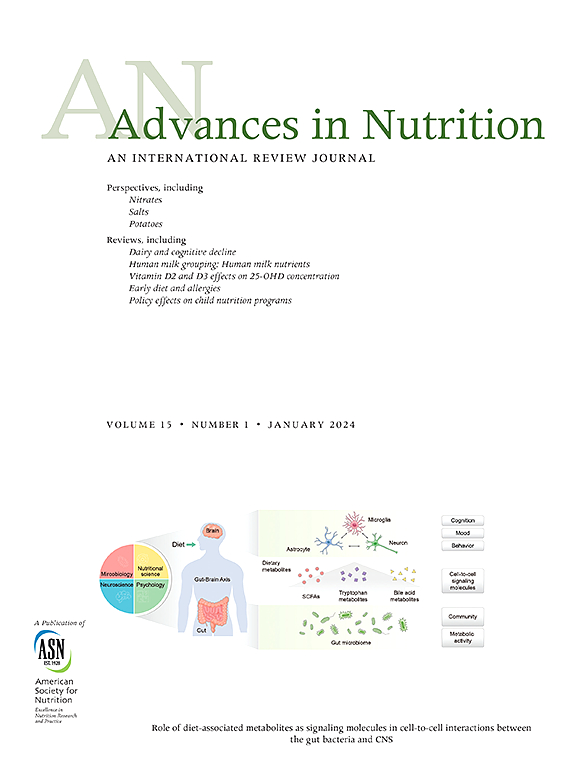Associations between Diet and Cognitive Function in Stroke Survivors: A Systematic Review and Meta-analysis
IF 9.2
1区 医学
Q1 NUTRITION & DIETETICS
引用次数: 0
Abstract
Poststroke cognitive decline is a major form of disability in stroke survivors. Although dietary interventions have shown potential in improving cognitive outcomes in stroke-free populations, their effects on stroke survivors remain unclear. This review aimed to evaluate associations between diet and cognitive function in stroke survivors. MEDLINE, Embase, Scopus, and CINHAL were searched for studies from inception to 16 December, 2024. Eligible articles were observational and interventional studies on adult stroke survivors that evaluated the association/effect of any nutritional exposure/intervention on cognitive performance and dementia risk. Studies were excluded when an intervention was combined with nonnutritional treatment. Random-effects meta-analysis was used for similar randomized clinical trials. This review included 20 clinical trials and 14 observational studies assessing the intake of energy and proteins and a variety of single nutrients, as well as dietary patterns, single foods, and phytochemicals. Meta-analyses revealed a positive effect of energy-protein supplementation on global cognition [standardized mean difference (SMD): 0.62; 95% confidence interval (CI): 0.15, 1.08; P = 0.009], and a negative effect of B-vitamins (folic acid, vitamin B6, and vitamin B12) (SMD: −0.40; 95% CI: −0.72, −0.08; P = 0.02). Adherence to the Mediterranean-Dietary Approaches to Stop Hypertension (DASH) Intervention for Neurodegenerative Delay and plant-based diets, as well as higher consumption of fruits, milk, coffee, vitamin E, and selenium, were related to better cognitive outcomes; no significant association was observed for adherence to DASH and Mediterranean diets and consumption of vitamins D and C. Butter and sugar intake and calcium supplementation were associated with negative cognitive outcomes. Mixed results were seen for omega (ω)-3, tea, and plant extracts. The available evidence indicates that energy-protein supplementation may benefit cognition after stroke, whereas B-vitamin supplementation has no effect. The substantial heterogeneity among studies hinders conclusions about other dietary strategies.
This review was registered with PROSPERO as CRD42024541785.
中风幸存者饮食与认知功能的关系:一项系统综述和荟萃分析。
脑卒中后认知能力下降是脑卒中幸存者残疾的主要形式。虽然饮食干预已显示出改善无中风人群认知结果的潜力,但其对中风幸存者的影响仍不清楚。本综述旨在评估中风幸存者饮食与认知功能之间的关系。检索MEDLINE、Embase、Scopus和CINHAL从成立到2024年12月16日的研究。符合条件的文章是对成年中风幸存者的观察性和干入性研究,这些研究评估了任何营养暴露/干预与认知能力和痴呆风险的关联/影响。当干预与非营养治疗相结合时,研究被排除在外。随机效应荟萃分析用于类似的随机临床试验。这篇综述包括20项临床试验和14项观察性研究,评估了能量和蛋白质的摄入量,各种单一营养素,以及饮食模式,单一食物和植物化学物质。荟萃分析显示,补充能量蛋白对整体认知有积极影响(标准化平均差值(SMD): 0.62, 95%可信区间(CI): 0.15, 1.08, p = 0.009), b族维生素(叶酸,B6和B12)有负面影响(SMD: -0.40, 95% CI: -0.72, -0.08, p = 0.02)。坚持地中海- dash干预神经退行性延迟(MIND)和植物性饮食,以及摄入更多的水果、牛奶、咖啡、维生素E和硒,与更好的认知结果有关;没有观察到坚持饮食方法来停止高血压(DASH)和地中海饮食以及维生素D和c的消耗与负面认知结果相关。黄油和糖的摄入以及钙的补充与负面认知结果相关。omega-3、茶和植物提取物的效果好坏参半。现有证据表明,补充能量蛋白可能有利于中风后的认知,而补充b族维生素则没有效果。研究之间的巨大异质性阻碍了对其他饮食策略的结论。本综述已在普洛斯彼罗(PROSPERO)注册。CRD42024541785)。意义声明:本系统综述提供了饮食与中风后认知结果之间关系的见解,表明补充能量蛋白可以增强中风幸存者的认知功能,而补充b族维生素可能会对认知结果产生负面影响。
本文章由计算机程序翻译,如有差异,请以英文原文为准。
求助全文
约1分钟内获得全文
求助全文
来源期刊

Advances in Nutrition
医学-营养学
CiteScore
17.40
自引率
2.20%
发文量
117
审稿时长
56 days
期刊介绍:
Advances in Nutrition (AN/Adv Nutr) publishes focused reviews on pivotal findings and recent research across all domains relevant to nutritional scientists and biomedical researchers. This encompasses nutrition-related research spanning biochemical, molecular, and genetic studies using experimental animal models, domestic animals, and human subjects. The journal also emphasizes clinical nutrition, epidemiology and public health, and nutrition education. Review articles concentrate on recent progress rather than broad historical developments.
In addition to review articles, AN includes Perspectives, Letters to the Editor, and supplements. Supplement proposals require pre-approval by the editor before submission. The journal features reports and position papers from the American Society for Nutrition, summaries of major government and foundation reports, and Nutrient Information briefs providing crucial details about dietary requirements, food sources, deficiencies, and other essential nutrient information. All submissions with scientific content undergo peer review by the Editors or their designees prior to acceptance for publication.
 求助内容:
求助内容: 应助结果提醒方式:
应助结果提醒方式:


